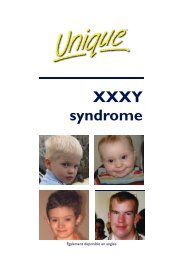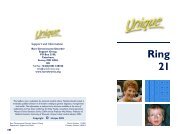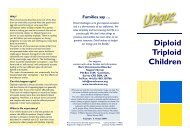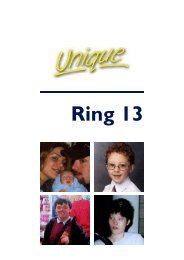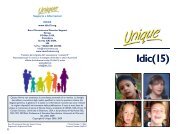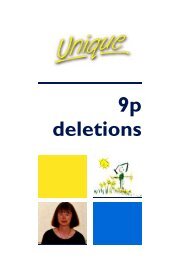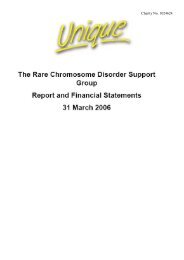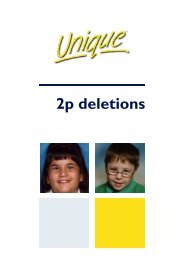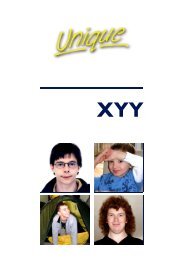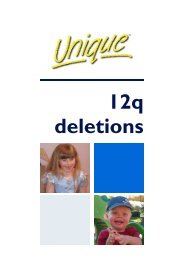19p13.2 microdeletions - Unique The Rare Chromosome Disorder ...
19p13.2 microdeletions - Unique The Rare Chromosome Disorder ...
19p13.2 microdeletions - Unique The Rare Chromosome Disorder ...
You also want an ePaper? Increase the reach of your titles
YUMPU automatically turns print PDFs into web optimized ePapers that Google loves.
As a newborn, she didn’t sleep for more than 45 minutes at time. She had trouble<br />
falling asleep and staying asleep. She often swished her head back and forth on her<br />
pillow, almost violently, to go to sleep. She screamed when we put her down to sleep<br />
on her back (the recommended sleeping position) and in her car seat. Now, at aged 7<br />
years, she falls asleep easily and sleeps through the night. However, she wakes up<br />
between 4 and 4.30am most mornings and cannot go back to sleep. She spends her<br />
days very tired and collapses into bed at night. We’ve been trying to get her to at least<br />
stay in bed until 5am, using a clock that lights up when it’s time for her to get up.<br />
Sometimes she can do this but it isn’t really helping because what she really needs is<br />
to be able to go back to sleep – 7 years<br />
She has always been a poor sleeper. She’s been on medication (melatonin) since<br />
age 6 but still wakes very early, regardless of the time she went to bed. She sleeps for<br />
approximately 7 hours a night but has numerous awakenings – 16 years<br />
For some individuals, sleep is not an issue:<br />
He has always been a big sleeper. He sleeps 8-10 hours a night and he sleeps<br />
deeply. As a baby, he slept that much along with two-2 hour naps each day – 16<br />
years<br />
Medical concerns<br />
Some of these features occur more frequently than in the general population, such as eye<br />
problems whilst with other features, such as the ‘hole in the heart’ and ‘seizures, the<br />
small numbers involved means it is difficult to be sure that they are associated with the<br />
microdeletion.<br />
• Heart<br />
Two <strong>Unique</strong> members had a heart murmer; one is described as innocent (the heart is<br />
working normally and there isn’t anything to worry about) and the other was investigated<br />
but nothing abnormal was found. Heart murmers are commonly heard, in the population<br />
as a whole, as an extra or unusual sound when clinicians listen to a child’s heartbeat.<br />
One <strong>Unique</strong> member had an atrial septal defect (ASD), also known as a ‘hole in the heart.’<br />
This is a type of congenital (present at birth) heart defect, in which there is an abnormal<br />
opening in the dividing wall between the upper filling chambers of the heart. <strong>The</strong> hole<br />
may close on its own naturally, soon after a child is born, or (as is the case here) it can be<br />
closed surgically. One person on Decipher, and two of the three people described in the<br />
medical literature also had an ASD; one of these was described as not being of clinical<br />
relevance (Lysy 2009, Haberlandt 2012, Decipher).<br />
• Seizures<br />
One <strong>Unique</strong> child has had one seizure, or fit, the cause of which is unknown. Another<br />
started having seizures at 18 months and at 16 years has intractable (hard to control)<br />
epilepsy. She has had a VNS device implanted to try and help. Vagus nerve stimulation<br />
(VNS) is designed to prevent seizures by sending regular, mild pulses of electrical energy<br />
to the brain via the vagus nerve.<br />
In the medical literature, the first sign of the <strong>19p13.2</strong> deletion in one child was multiple<br />
seizures, although an EEG (electroencephalogram to show brain electrical activity)<br />
appeared normal (Haberlandt 2009). In contrast, another child has not had any seizures<br />
but a neonatal EEG revealed some abnormalities in brain activity (Lysy 2009).<br />
19



